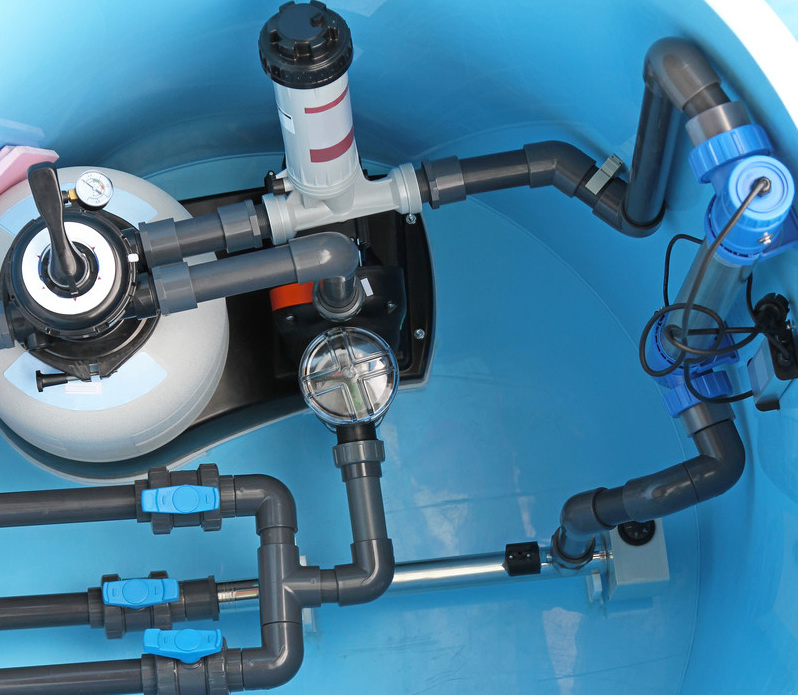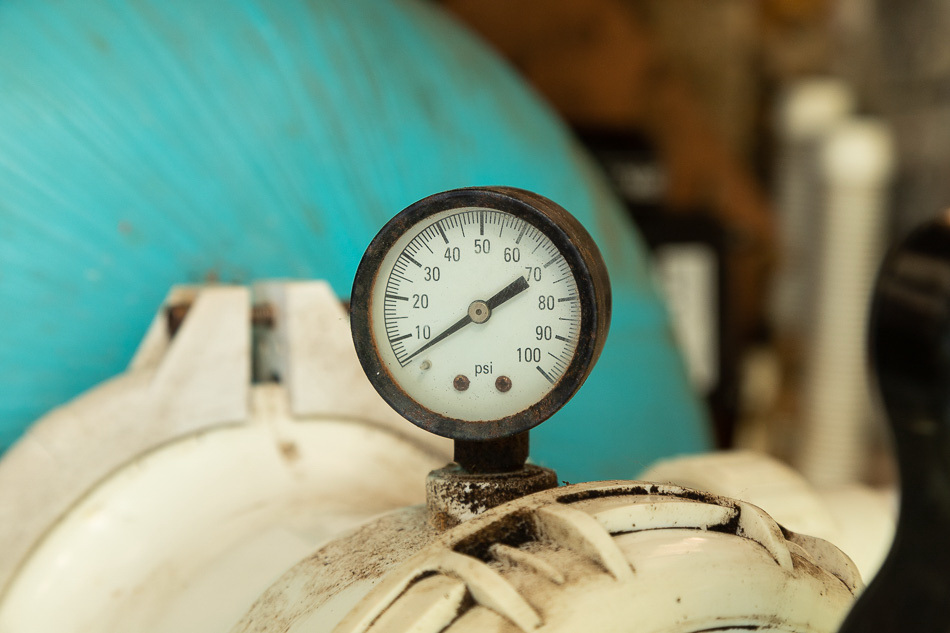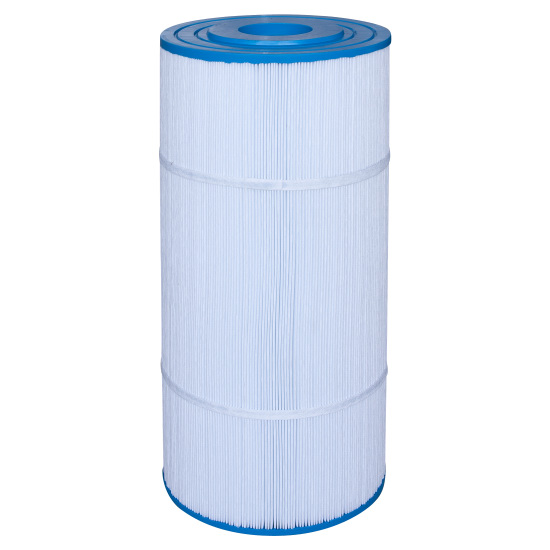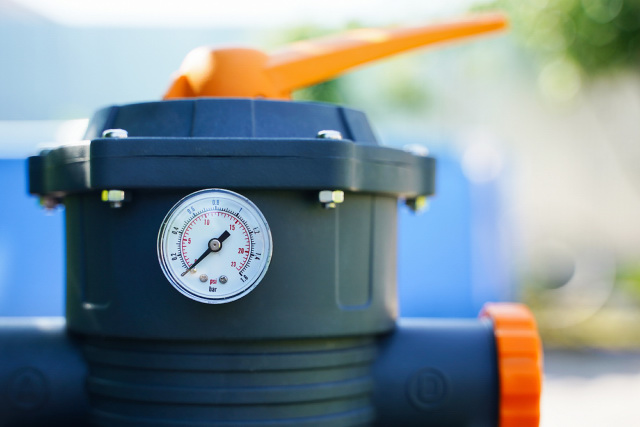Is your pool’s pressure gauge swinging over the limit? Are you struggling to find out what the problem might be with your pump? Don’t worry, a high pressure reading is quite common.
And believe me, as a pool owner myself, I’ve come across it many times now. But luckily, today, I’ll show you why your filter pump pressure might be high and how you can fix it.
The most common reason for high pressure on your filter pump is a dirty filter. Whether you have a sand filter, DE filter or cartridge filter, dust and solid particles will slowly clog your filter causing the pressure to rise. To fix this, backwash your filter or in the case of cartridge filters, hose it out.
Reasons for a a filter pump and system to have a high pressure reading include:
- Dirty filter
- Problems with the pressure gauge
- Air leak in your filtration system
- Narrow water jets
- Clogged or broken filter breather tube
- Filter media is dirty or damaged
- Filter pump is too big
- Diverter valves are closed or partially closed
- Pool doesn’t have enough water

Article Contents
What is Considered High Pool Pump Pressure?
Before you rush out and start taking apart your filter system, let’s look at what is considered high pressure in your pool’s filtration system.
Normal pressure for most pools is between 10 and 25 PSI (70-170 kPa). The pressure for filtration systems varies depending on the type of filter, the size of the lines, the pump and other pool equipment.
High pressure is considered to be 5-10 PSI or above the usual pressure reading. For example, when you have a clean filter, you know that your pool usually runs at 13 PSI. If your pressure is now 20 PSI, you know the pressure is high and something isn’t right.
How To Fix High Pressure In Pool Filter Pump
1. Clean Dirty Pool Filter
A dirty filter is the easiest to fix and the most common cause for high pressure. As I said above, the small dirt particles will accumulate over time and start to block water flow causing high pressure.
Fix: This is easy to solve as all you have to do is give your filter a good clean!
For DE and Sand Filters, simply backwash your filter. Check the pressure again when done to see if it has reduced back to normal.
Here’s a full guide on backwashing your filter:
How to Backwash a Pool Filter & How Often
If you have a cartridge filter, you can hose it out or use a cartridge cleaning chemical – this will help with sticky residue water won’t be able to remove. If you regularly clean your filter, you have a better chance of keeping it for longer.
- Restores filter performance
- Fixes high pressure issues & clears cloudy water
- If cleaning the filter is unsuccessful, renew it
We show you how to deep clean your cartridge filter here. Older cartridge filters should be replaced as they can only be cleaned so many times.
2. Check Your Pressure Gauge
- Ensure you have an accurate pressure reading
- Cheap to buy & easy to replace
- The replacement range will fit most filters
If cleaning your filter didn’t work, don’t spend hours checking your filtration system. It could be as simple as a faulty pressure gauge.
Just like turning your phone on and off the moment an app starts malfunctioning, you should go to the simplest solution first.
Fix: To do this, flick the gauge to see if the needle props up, check the dial to see if it’s bent in any way, and make sure it goes to zero when you turn the pump off.
If the needle doesn’t move, try replacing it. A pressure gauge is affordable and cheap to replace.
If your pressure gauge is good, then you can move on to other possible reasons for why your pump pressure is high.

3. Check If Your Water Jets Are The Right Size
This isn’t a problem pool owners often think of, but if your jets are too small, or the fitting around it is too restrictive, this can cause pressure to build up.
As a result, your pool system will be working a lot harder than it has to.
Fix: To check this, remove the existing jet fittings. Does the pressure go back down to normal? If it does, replace them with larger ones. This will improve the water flow in your pool drastically.
4. Winterizing Plugs Left In
Leaving any winterizing plugs in will block up the lines and prevent the water flowing. When water is blocked from flowing the filter pressure will rise.
Fix: Carefully check you’ve removed all winterizing plugs.
5. Check Your Breather Tube
The breather tube helps purge any air trapped at the top of your filter. If this guy gets clogged, the air will build up in that area and cause the pressure to rise.
Fix: Switch everything off, release the pressure in your filter and open it up.
First, check the tube for any cracks. Don’t hesitate to replace it if it looks a little old or damaged. This small change will help keep the pressure stable in your pump.
Second, check for any debris inside the tube. You can use the hose to give a quick wash. Reattach it, and run the pump. If a blockage was the cause, the pressure should return to normal immediately.
6. Too Much Filter Medium or Wrong Type
In order to keep your filter nice and healthy, you’ll want to change the media now and again. As I’m writing this article, sand, glass, and cartridge are among the most popular media pools owners use for their filters.
If you’ve recently changed your filter’s media, this might be the problem. For instance, if you’ve added too much sand or DE in your filter, the water will have trouble going through.
The wrong grade of media could also cause a higher pressure.
Fix: Take out some of the filter media or replace it with the correct grade.
| Image | Product | Features | Link |
|---|---|---|---|
 | This pool filter sand is natural, clean, and compatible with all swimming pool sand filters. It traps small particles and does not clog or channel. | 9.7 | Check Price |
 | Pool Filter DE (Diatomaceous Earth) Powder This DE powder is the correct grade for most swimming pool DE filters. It's high-grade and filters down to 2 microns. It comes in 24 lbs packs. | 9.5 | Check Price |
7. Check Your Diverter Valves
If you have diverter valves after the pump, check that they are properly open. If they are a little closed, the water won’t flow properly causing a rise in pressure.
Fix: So make sure you just have a look at the valves and open them up if you need to.
8. Pump or Filter are the Wrong Size
Some pool owners experience a high pressure in their pump just after a pump or a filter change. If this is you, then you might have messed up when you replaced the equipment.
Filters have a maximum flow rate and if the pump supplies a higher flow rate than the filter can handle, the pressure will rise.
If this is the case, check the horsepower and flow rate of your pump as the flow rate of your filter.
If your pump is too big, you can use a smaller pump or in some cases, the impeller can be replaced with a smaller one.
Or if you have a two speed or variable speed pump, then it could be as simple as using the lower speed setting so that the system can handle the water flow better.
Why is high pressure bad?
When your pump pressure is too high, it means your filtration system is working a lot harder than it should be to get the water flowing properly.
When this happens the pump itself needs to work harder. This can damage the impeller, the motor itself and cause some of the parts to wear quickly due to increased heat and friction.
Final thoughts
We’ve now gone through 9 possible reasons why you might have high pressure in your pool. Here’s a summary of what we’ve discussed so far:
- Check the pressure gauge is working correctly
- Make sure your filter is cleaned on a regular basis
- Check the size of your pomp and filter
- Be careful not to apply too much sand or DE media
- Check for suction leaks in your pump.
And if you’ve checked all of these things, and the pressure still rises rapidly, even after cleaning, check out our article here:
Filter Pressure Rises Rapidly After Backwash or Cleaning
Now you’re all set! Enjoy a properly functioning pool and keep your equipment healthy for years to come. Let us know how you get on.
Related Reading: What is a Normal Pool Filter Pressure Range?



